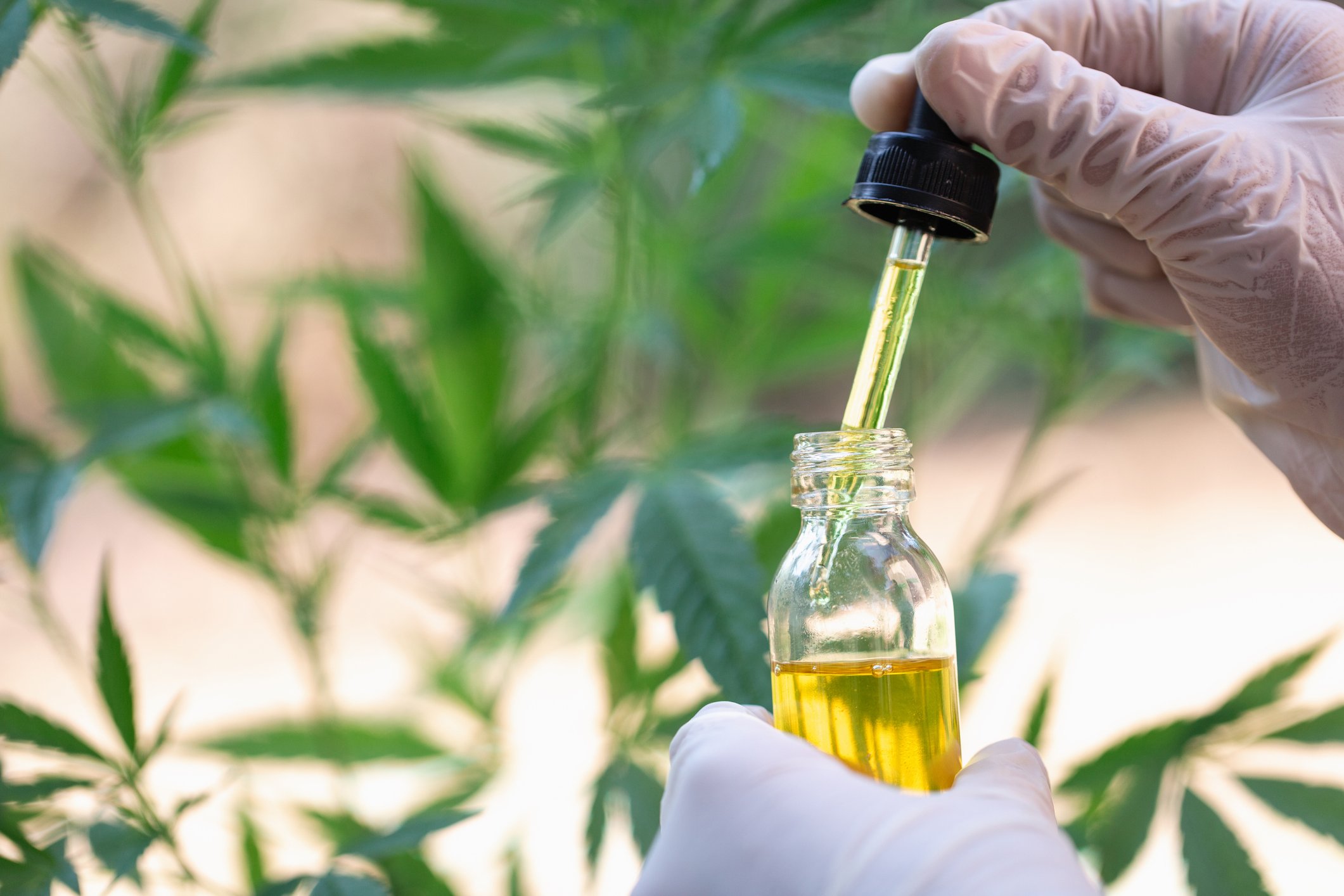Unless you've been living under a rock for the past decade, you've probably taken notice of the "green rush," or in layman's terms, the progress that the cannabis movement has made. Once considered a taboo topic that politicians cast aside, marijuana is now a mainstream issue, and one that more people than you might realize support.
According to Gallup's national survey that gauges the public's perception on marijuana, an all-time record 66% of adults favored legalization in October 2018. This is a big reason why 33 U.S. states have now waved the green flag on medical marijuana, 10 of which have also legalized recreational pot.

Image source: Getty Images.
The "rise of the derivatives" puts CBD on a pedestal
But you'd be mistaken if you thought that the marijuana movement was all about dried cannabis flower. While that might have been the case for your parents or grandparents, it isn't anymore. Nowadays, derivative products, such as oils, vapes, edibles, concentrates, topicals, sublingual sprays, and cannabis-infused beverages, are all the rage. And stuck firmly within this "rise of the derivatives" is the increasingly popular cannabinoid known as cannabidiol (CBD).
Although there have been at least 113 different cannabinoids isolated by researchers, pretty much all the buzz surrounding marijuana and hemp plants revolves are two cannabinoids: tetrahydrocannabinol (THC) and cannabidiol. THC is the psychoactive cannabinoid that gets a user high, whereas CBD is the nonpsychoactive cannabinoid best known for its perceived medical benefits. Since CBD won't get the user high, it's the perfect means to lure in new customers who might otherwise not try a cannabis or hemp-related product.
What's more, products containing CBD could turn out to be the bread and "budder" of most cannabis companies' portfolios. Dried cannabis traditionally is a low-margin product since it's easily oversupplied and tends to be commoditized over time. Meanwhile, CBD has yet to be oversupplied, and it can be extracted in abundance from cheap-to-grow hemp plants. This makes CBD products a higher-priced, higher-margin opportunity for the marijuana industry.

Image source: Getty Images.
With CBD sales set to soar, these surprising companies are now on board
Just how big of an opportunity is CBD? Well, the Brightfield Group has forecast a compound annual growth rate of 147% for global CBD sales between 2018 and 2022. In nominal dollars, we're talking about a surge from $591 million in sales in 2018 to around $22 billion by 2022.
This growth estimate isn't going unnoticed by cannabis companies, or by a handful of retailers that you might never have guessed are now selling CBD products. Sure, you may heard by now that drugstores like CVS Health, Walgreens Boots Alliance, and Rite Aid are carrying CBD topicals. But the following four retailers are probably going to be a bit of a shock.
Designer Brands
Formerly known as DSW, footwear and accessories retailer Designer Brands (DBI +0.90%) turned heads in January when it announced a deal to carry CBD-rich topical creams, muscle balms, and body lotions with Green Growth Brands (GGBXF +0.00%). Designer Brands and Green Growth Brands had tested these topicals in 10 stores over a 10-week period and saw a 74% sell rate, prompting the duo to expand the partnership to 96 U.S. stores, with Designer Brands taking on close to 55,000 units of CBD products. It's a win-win for both companies, with Designer Brands gaining a high-margin complementary sales item that takes up minimal space in its stores, and Green Growth Brands getting an opportunity to broaden the appeal of its Seventh Sense brand.

Image source: Getty Images.
Urban Outfitters
A little more than two weeks ago, U.S.-focused vertically integrated dispensary operator iAnthus Capital Holdings (ITHUF 4.76%) announced that CBD For Life, a brand that it agreed to acquire in late March 2019, had struck a deal with Urban Outfitters (URBN 0.04%) to carry its products in six initial locations (two in California, four in New York), as well as on its e-commerce platform. Urban Outfitters is a retailer that caters to men and women aged 18 to 30 and, as a general rule, favorability toward cannabis and derivatives tends to increase as age decreases. This makes this decision a no-brainer for Urban Outfitters, and gives iAnthus Capital, which acquired MPX Bioceutical earlier this year, one added sales channel to further expand its reach.
Neiman Marcus
Privately held luxury retailer Neiman Marcus announced in mid-January, just about a week before Designer Brands made its deal with Green Growth Brands, that it would be carrying an assortment of CBD products at five of its locations, as well as online. Catering to the well-to-do is something quite a few pot stocks have targeted, since the wealthy aren't likely to be attached to traditional cannabis culture, and are therefore less likely to change their buying habits if the U.S. or global economy suffers a hiccup. In other words, it could become a high-margin add-on sale for Neiman Marcus.
Ulta Beauty
Last, but not least, cosmetics giant Ulta Beauty (ULTA +1.18%) announced in mid-March plans to carry its first-ever CBD skin-care brand. Ulta chose to carry five products from Cannuka, which blends CBD with manuka, a type of honey that's sourced from bees that pollinate Manuka trees. All told, Ulta is carrying these CBD products ranging from $9 to $58 online and in all of its stores, save for three states (Nebraska, Idaho, and South Dakota) where CBD laws remain strict, even following the passage of the Farm Bill in December.
As I said, this isn't your parents' or grandparents' marijuana industry any longer.



